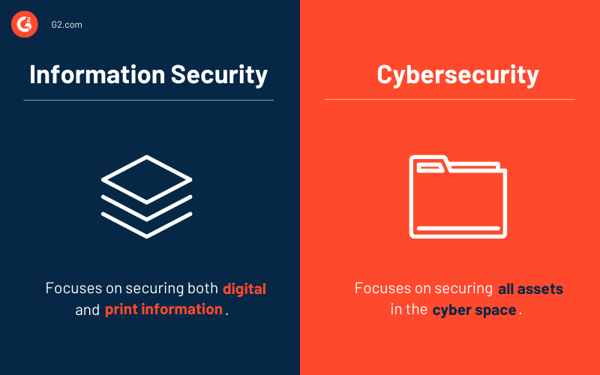February 11, 2021
 by Sagar Joshi / February 11, 2021
by Sagar Joshi / February 11, 2021

Data is paramount for every business that runs on the rails of modern technology.
It helps to make better decisions, plan impeccable strategies, and execute flawless tactics. Simply put, it serves as the foundation for businesses aspiring to reach their peak on the present-day market.
When you think about it, data and information have been your strongest allies in all walks of professional life. Now, when it comes to its security, it becomes a priority.
Information security safeguards the very roots of your businesses: the data and information assets. Whether it’s your knowledge base, information of your employees, customers, investors, or other stakeholders, information security helps you to protect it from malicious intentions.
Information security, also called infosec, is the practice of protecting your data and information from unauthorized access and maintaining its confidentiality, integrity, and availability at all times. It encompasses methods to secure private and sensitive information on print or digital media from unauthorized modification, deletion, disclosure, or disruption.
Overall, information security keeps your data and information safe from being exploited by threat actors. It guards your information assets while transferring them from one machine to another or through a physical medium.
Any good information security management program should be designed to achieve the three principles of information security. Together, they are commonly known as CIA: confidentiality, integrity, and availability. Let’s dive down into the details of the CIA triad.
The confidentiality principle keeps critical information safe from disclosure to unauthorized individuals, entities, or processes. It ensures that confidential information stays private unless someone needs it to finish their job duties.
You can maintain information confidentiality through passwords, encryption, multi-factor authentication, and several other ways. But first, it’s essential to define who can access what so that you can restrict unauthorized access to specific information.
The next element in the CIA triad is the integrity of information stored within your organization. Simply put, it identifies the completeness and accuracy of information by assuring that no entity has tampered with it, intentionally or accidentally.
It guarantees that the data and information are accurate, and you can trust it. Generally, an information security system that protects confidentiality also caters to the integrity principle, as it scrutinizes access rights and ensures that only authorized people can see the information.
The CIA triad’s availability principle validates that the information is available whenever an authorized individual, entity, or process needs it. It protects the functionality of the support systems, making data available when you need it to make decisions.
It involves ensuring that you have the required network and computing resources to facilitate the expected movement of data. Cyber attacks like denial of service (DoS) attacks have the potential to compromise the availability of information. You should maintain a backup so that information availability doesn’t get impacted during IT security incidents.
Apart from the fundamental principles of information security, other principles govern its measures and practices::
The CIA triad guarantees that the information is not exposed to modification, deletion, disclosure, or disruption caused due to unauthorized entities and emphasizes information assurance.
Information security encompasses various subtypes that play an essential role in protecting a specific type of information, usage of relevant tools, and areas where the data needs protection.
Application security measures protect the information in applications from breaches caused due to vulnerabilities in web or mobile applications and application programming interfaces (APIs). These vulnerabilities might be resting in user provisioning or authentication, code of the program, configurations, and policies and procedures associated with it.
Application security involves using specific tools used for shielding, scanning, and testing applications. It does not only include the application that you develop but also others that you use.
Infrastructure security ensures that your networks, servers, data centers, labs, desktops, and mobile devices are secure. With the increasing connectivity, it’s essential to maintain security around devices, as even a minor vulnerability can jeopardize the entire network security.
Infrastructure security practices emphasize the adoption of security tools such as DNS protection software, firewall, intrusion detection systems, network security controls, data center security, and more.
Cloud security presses on protecting applications built or hosted in the cloud. It makes it essential for businesses to keep a close watch and necessary isolation of different applications functioning in a shared environment. It emphasizes leveraging relevant tools for the cloud to detect vulnerabilities in shared environments like the public cloud.
Cloud security also converges attention on centralized security management and tooling while steering the necessary focus toward third-party applications running on the cloud. It stages essential restrictions on accessibility and control on vendor applications to avoid their vulnerabilities affecting your business. Cloud security monitoring and analytics software helps businesses succeed in this regard.
The vulnerability management process envelops scanning your networks, computer systems, and applications for vulnerabilities that pose a security risk to your information security.
As businesses tend to add new applications, users, and environments continually, vulnerability management helps them identify security weaknesses and remediate those to ensure proper risk management. It allows businesses to avoid the dangers posed by an exploited vulnerability and prevent a data breach.
Incident response is a systematic approach for handling and managing a security incident while minimizing its impact on the business. It’s essential that you have a proper incident response plan to deal with a security breach to limit the damages and costs associated with it while improving your response time.
Information security practices encourage the adoption and usage of tools to respond to a security incident. These tools can include SIEM systems to monitor logs and preserve them for forensic analysis, incident response software, and several others.
Cryptography is an essential part of information security as it prevents data and information from being exposed. Encryption helps to secure information and shields it from unauthorized access, maintaining data integrity and confidentiality.
Good information security cryptography will include using an advanced encryption standard (AES), a symmetric key algorithm typically used by the government to protect classified information.
Information security and cybersecurity are seldom used interchangeably. In reality, cybersecurity is an umbrella term that envelops information security as one of its disciplines.

Cybersecurity deals with protecting all your IT assets from cyber attacks. In comparison, information security focuses explicitly on securing your data and information. The next difference between the two boils down to the type of assets being protected. Cybersecurity essentially shields assets in cyberspace. In contrast, information security guards information assets, which can be both digital or print.
To be more specific, cybersecurity is managed by professionals who are experts in handling advanced persistent threats (APT). On the other hand, information security is practiced by professionals who hone data security practices and are more inclined toward prioritizing resources rather than eliminating the threats like malware, ransomware, and more.
There is an overlap between the two as they cater to a unified motive of keeping your IT assets secure.
When you intend to make strides in information security professionally, you can earn a few certifications to obtain a competitive edge. It provides a benchmark to your expertise as a security analyst and complements the quality of your skillset.
The information security certifications are as follows:
Apart from the above, there are various other information security certifications you can plan to earn and steer your professional growth ahead.
Create your information security policy targeted toward achieving the CIA triad and make your business secure, not just for yourself but the multitude of clients you cater to.
It's advisable to conduct information security awareness training in your organization to ensure that employees are well-informed about the threats that may put your security at risk.
Learn more about user provisioning to regulate the access privileges of end-users and keep your information secure.
Sagar Joshi is a former content marketing specialist at G2 in India. He is an engineer with a keen interest in data analytics and cybersecurity. He writes about topics related to them. You can find him reading books, learning a new language, or playing pool in his free time.
Regardless of your industry, your business's data needs protection. This is especially true as...
 by Holly Landis
by Holly Landis
Here’s a number that should make every IT leader sit up straight: the average cost of a data...
 by Holly Landis
by Holly Landis
Regardless of your industry, your business's data needs protection. This is especially true as...
 by Holly Landis
by Holly Landis
Here’s a number that should make every IT leader sit up straight: the average cost of a data...
 by Holly Landis
by Holly Landis



